Publication
Article
DocMVP: John Luo, MD
Our latest addition to the Pulse section will highlight physicians who are "bringing healthcare technology into practice." This month, we profile our newest Editorial Board member, John Luo, MD.
When did you first start bringing healthcare technology into your practice?
When I was at UC Davis, I decided that the signout process on the weekend wasn’t working. It used paper forms that had notes like, “You have to see Joe Smith in tower three because he’s depressed.” I remember looking at it one weekend and saying “I can’t read this.” So I started a project that provided all the resident physicians with Palm Pilots so they could enter this information and beam it electronically to the on-call physicians.
What other technologies do you utilize in your daily practice?
My BlackBerry makes it easy to access my e-mail and calendar wherever I go. I also use it to send alpha-numeric pages to my residents; that way, I can be doing supervision over lunch but still be responsive to a crisis in the ER. I also use a Sony UX180 handheld that I can take with me if I need to remotely access information. I was also actually an early adopter of ePrescribing. I learned an early lesson: although ePrescribing has great benefi ts, it requires a significant amount of infrastructure to make it effective. Now, I use the NEPSI (National ePrescribing Patient Safety Initiative) solution from AllScripts [see our piece on NEPSI], and send secure ePrescriptions to patients and pharmacies from my Palm Treo 750W.
What are the most significant developments in healthcare technology?
The idea that the appropriate amount of information can be delivered to you at the point of care. We’re still
working on that. Nowadays, if I pose the question “What’s been the trend in the patient’s liver function
test?” we can pick a range of dates and plot and see a trend graphically, which is helpful. I think the next big step is to connect that EMR data to real information and medical literature. We definitely need an EMR nationally. Right now, a lot of healthcare dollars and unnecessary tests are wasted on information that’s not readily available. A national information infrastructure is going to be really important for information exchange. But first there needs to be standardization of the EMR in terms of data format, and the government is really going to have to enforce a particular standard that all the major vendors can agree upon. In terms of disease surveillance, there should be centers where data can be exchanged for research and public health purposes.
Is there anything you’d like to say to our readers?
Physicians have been late adopters of technology. I would encourage readers to take a leap of faith, instead of taking the attitude that they want technology to be 100% reliable before they’ll use it.
